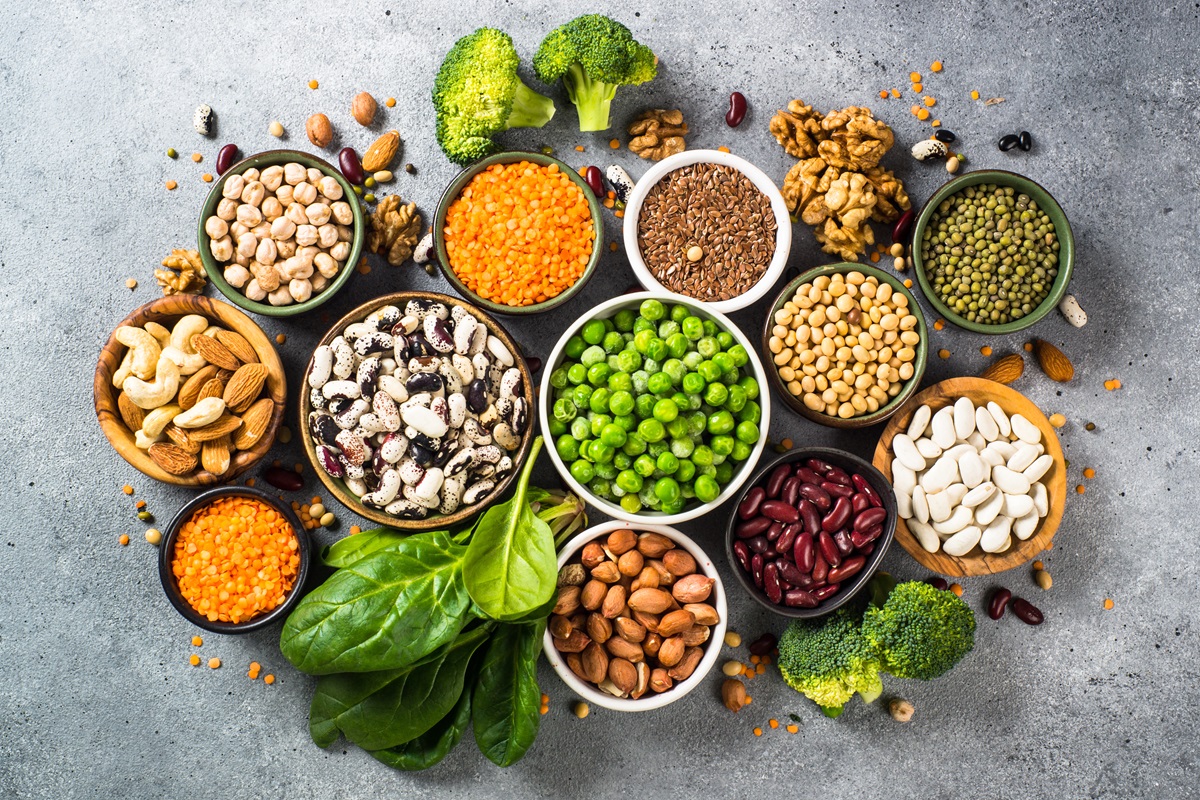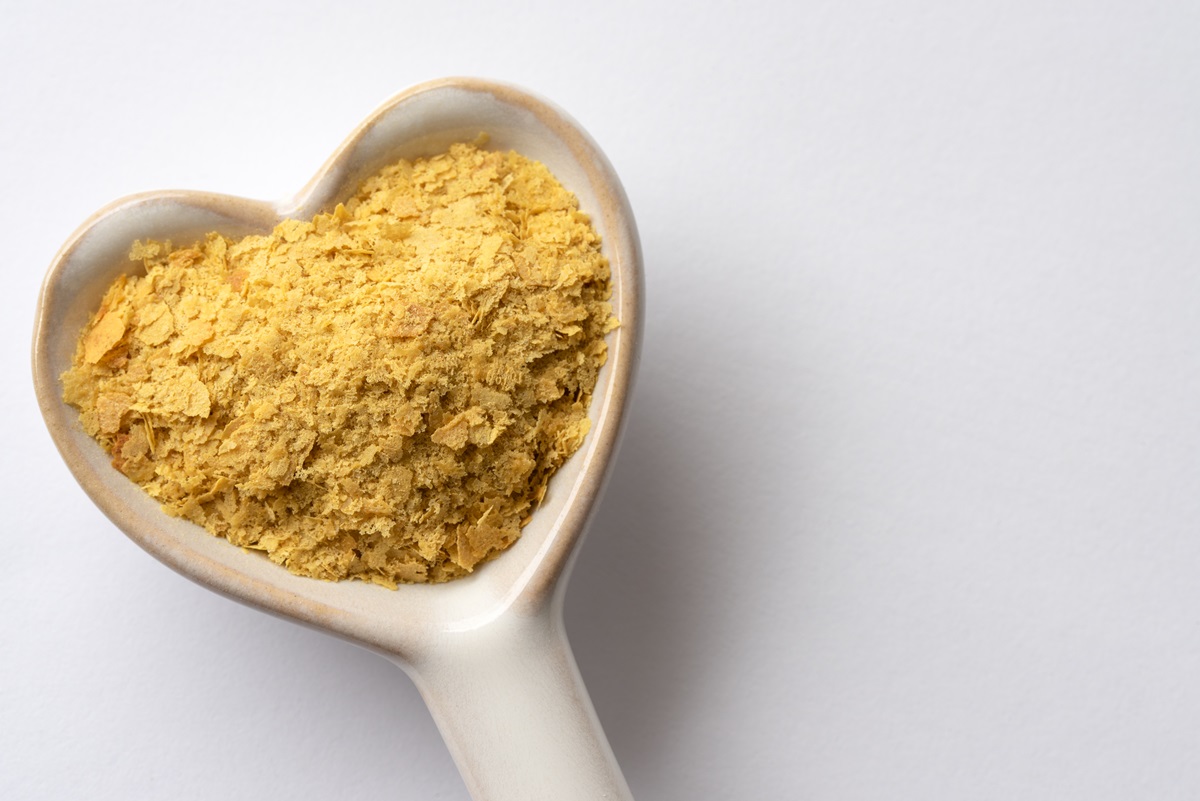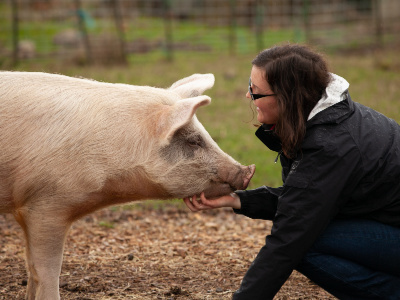In this blog, we address common concerns about vitamin B12.

One of the most frequently asked questions about veganism is “How do you get vitamin B12?”
While it requires more planning on a vegan diet, it is possible to get sufficient B12 without eating animals. You may have seen messaging in the media, on social media, or in advertising campaigns like AHDB’s ‘Let’s Eat Balanced’ which suggest meat and dairy are the only ways we can get vitamin B12.
If you’re confused about vitamin B12 and whether a vegan diet can provide enough, we’ve addressed these concerns in this blog.
Where does vitamin B12 come from?
Vitamin B12 is a complex vitamin that plays a key role in producing blood cells, DNA and supporting our nervous system.
Our bodies make B12, but we cannot use it so we must ensure we get enough from our diet. It can also come from microbes that live in the soil, but due to mineral depletion and soil desertification, it is no longer possible for us to get enough from the soil which food is grown in.
Although B12 is present in animal products, it is made by the bacteria inside animals and not by the animals themselves. As modern farming practices involve keeping animals indoors for most of their lives, many farmed animals cannot obtain B12 through soil and obtain it through supplemented feed instead.1,2
Meat and dairy are often touted as natural sources of vitamin B12, but the reality is that humans get B12 from animals because those animals are supplemented with it.
The Let’s Eat Balanced campaign refers to British meat and dairy as ‘natural sources of B12’ 3 which has been challenged by health professionals in the UK,4 not least because it failed to mention the health and environmental concerns around eating red meat and dairy products.5
The misconception that people who eat an omnivorous diet don’t rely on supplements for B12 just isn’t true. In fact, it is common for everyday foods to be fortified with vitamins and minerals in the UK.
Are there any vegan B12 sources?
While some plant-based foods are fortified with vitamin B12 such as cereals, plant milks, bread, and nutritional yeast, we may not get a reliable amount from these foods alone.
As such, anyone adopting a plant-based diet should take a regular supplement of vitamin B12 alongside consuming fortified foods to be safe.
In the UK, the recommended intake is 1.5 μg for adults, but it is wise to supplement a higher amount to ensure we absorb enough.
We suggest taking a daily supplement of 25-100μg or a weekly dose of 2000μg. People aged over 50 or those with conditions like coeliac disease might need at least 50μg.6 By taking a supplement instead of getting B12 from farmed animals, vegans are removing the middle man.

Can vegans become deficient in B12?
Our bodies can store B12 for 2-5 years, but we must ensure we are regularly consuming enough, regardless of diet. Signs of vitamin B12 deficiency include fatigue, numbness, tingling, loss of memory and anaemia, and it can lead to nerve damage if left untreated.
According to the NHS, vitamin B12 deficiency is more common in adults aged 65 and over as absorption decreases as we age.7 There is also an increased risk of deficiency during pregnancy.8
While vegans and vegetarians have an increased risk of deficiency if not supplementing B12, pernicious anaemia – which prevents the body from absorbing B12 from our diets – is the most common cause of vitamin B12 deficiency in the UK.9
The importance of a well-planned diet
It is widely accepted that a well-planned vegan diet can meet our nutritional needs at all stages of life.10 However, it is crucial to ensure that we are not missing out on any essential vitamins and minerals when transitioning to a plant-based diet.
Those who are taking part in Veganuary are unlikely to develop deficiencies by eating vegan for one month, but people who are choosing to stay vegan should start supplementing vitamin B12.
Everyone who joins our 31-day email series receives daily tips, nutrition support and free resources to help transition to a plant-based diet. Those who are concerned about deficiencies or changing their diets should consult their GP or a nutrition expert.
Helpful resources
- Veganuary’s webinar with Plant-Based Health Professionals
- The Vegan Society
- Plant-Based Health Professionals
- Dr Greger’s Daily Dozen
References
1. González-Montaña, J.-R., Escalera-Valente, F., Alonso, A.J., Lomillos, J.M., Robles, R. and Alonso, M.E. (2020). Relationship between Vitamin B12 and Cobalt Metabolism in Domestic Ruminant: An Update. Animals, [online] 10(10), p.1855. Available at: pubmed.ncbi.nlm.nih.gov [Accessed 15 Jun. 2024].
2. Wang, R., Bai, Y. and Yang, Y. (2022). Effects of dietary supplementation of different levels of vitamin B 12 on the liver metabolism of laying hens. Journal of the Science of Food and Agriculture, [online] 102(13). Available at: pubmed.ncbi.nlm.nih.gov [Accessed 15 Jun. 2024].
3. Let’s Eat Balanced (2024). Let’s Eat Balanced. [online] Available at: letseatbalanced.com [Accessed 12 Jun. 2024].
4. Lee, M. and Kassam, S. (2024). Open letter to AHBD and DEFRA. [online] Plant Based Health Professionals UK. Available at: plantbasedhealthprofessionals.com [Accessed 12 Jun. 2024].
5. Webster, B. (2024). Minister who owns beef farm approved £5m ad campaign promoting red meat. [online] OpenDemocracy.net. Available at: opendemocracy.net [Accessed 12 Jun. 2024].
6. Plant-Based Health Professionals UK. (n.d.). Micronutrients. [online] Available at: plantbasedhealthprofessionals.com [Accessed 12 Jun. 2024].
7. NHS (2019). Vitamin B12 or folate deficiency anaemia. [online] NHS. Available at: nhs.uk [Accessed 12 Jun. 2024].
8. Niklewicz, A., et al (2022). The importance of vitamin B12 for individuals choosing plant-based diets. European Journal of Nutrition, [online] 62(3). Available at: pubmed.ncbi.nlm.nih.gov [Accessed 12 Jun. 2024].
9. NHS (2019). Vitamin B12 or folate deficiency anaemia. [online] NHS. Available at: nhs.uk [Accessed 12 Jun. 2024].
10. British Dietetic Association (2017). British Dietetic Association confirms well-planned vegan diets can support healthy living in people of all ages. [online] www.bda.uk.com. Available at: bda.uk.com [Accessed 15 Jun. 2024].











